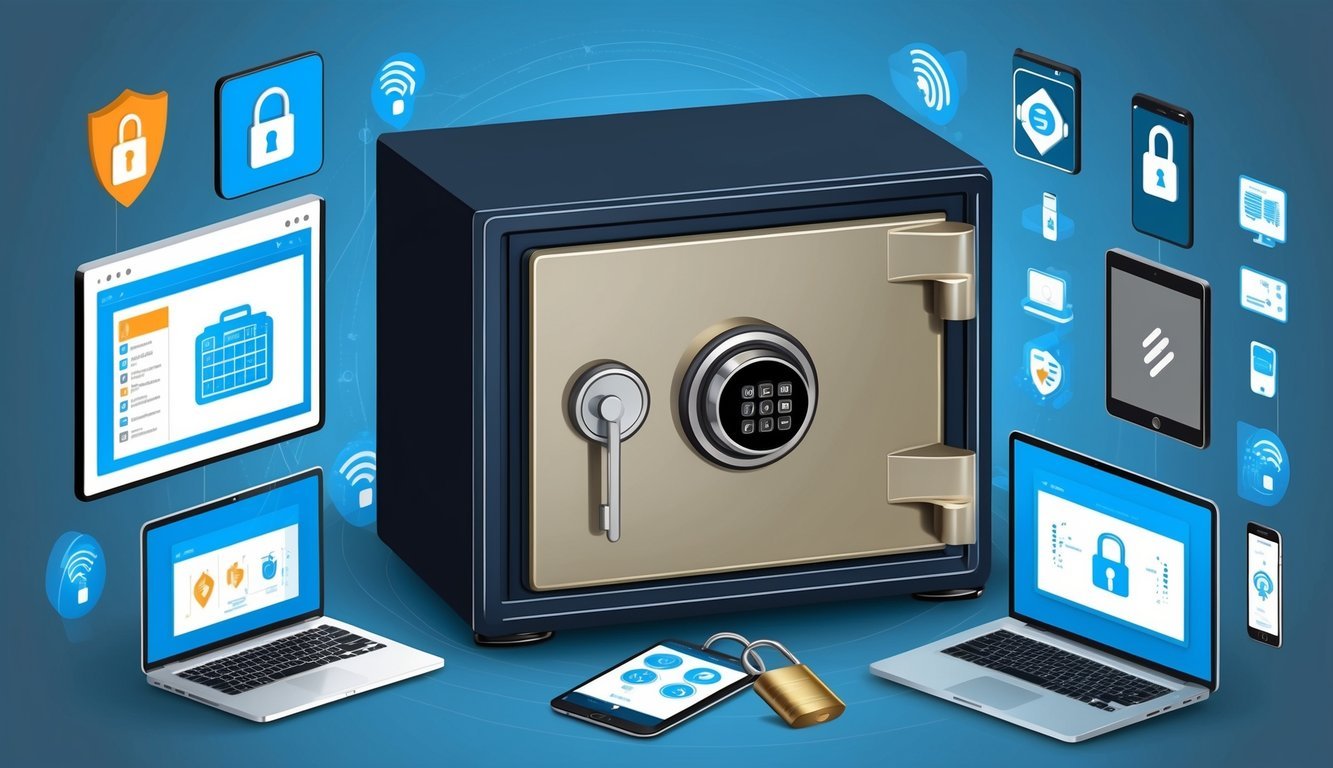Crypto estate planning is a new and important topic for anyone who owns digital assets. If you have Bitcoin, Ethereum, or other cryptocurrencies, you need to think about what will happen to them when you’re gone.
Estate planning for crypto assets makes sure your digital wealth can be passed on to your loved ones safely and legally.

Your crypto holdings are different from traditional assets like cash or property. They exist only in digital form and can be hard to access without special knowledge. This means you need to take extra steps to include them in your estate plan.
You’ll want to think about how to store your private keys, who should have access to them, and how to explain the process to your heirs.
Planning for your digital legacy isn’t just about passing on wealth. It’s also about protecting your privacy and making sure your wishes are followed. By taking the time to plan now, you can save your family a lot of trouble later and make sure your crypto assets don’t get lost forever.
Key Takeaways
- Crypto estate planning is crucial for passing on digital assets to heirs
- You need to document access to your cryptocurrencies and explain how to use them
- Consider legal and tax issues when including crypto in your estate plan
Understanding Crypto Estate Planning
Crypto estate planning helps you pass on your digital assets to loved ones. It involves special steps to protect and transfer your virtual currencies after you’re gone. This process includes creating a secure and accessible method for beneficiaries to claim their assets, which may involve using hardware wallets or specific blockchain technologies. Additionally, part of effective crypto estate planning is understanding crypto derivatives, as they can have implications for the overall value of your estate. By incorporating clear guidelines and documentation, you can ensure that your digital wealth is safely transitioned to your heirs without unnecessary complications.
The Basics of Estate Planning with Digital Assets
When you own cryptocurrencies, you need to think about how to include them in your estate plan. Unlike traditional assets, crypto requires unique handling.
You’ll want to document where your crypto is stored and how to access it.
Make a list of all your crypto holdings. Include details like wallet addresses and exchange accounts. Don’t forget about any hardware wallets or paper backups.
Create clear instructions for your heirs on how to access your crypto. This might mean sharing private keys or recovery phrases. But be careful – you don’t want this info falling into the wrong hands.
Consider using a “dead man’s switch” for your crypto. This is a system that automatically transfers your assets if you don’t check in regularly.
Importance of Including Crypto in Your Estate Plan
Leaving out your crypto from your estate plan can cause big problems. Your heirs might not even know you own digital assets. Or they might know, but have no way to access them.
Crypto can be a significant part of your wealth. You wouldn’t want it to be lost forever. By planning ahead, you ensure your loved ones can benefit from your crypto investments.
Including crypto in your estate plan also helps avoid legal issues. Laws around estate planning and cryptocurrency are still new and changing. A solid plan can prevent disputes and tax problems.
Remember, crypto estate planning isn’t just for the wealthy. Even if you only own a small amount, it’s worth protecting.
Key Components of a Crypto Estate Plan
A solid crypto estate plan needs a few crucial elements. These parts work together to make sure your digital assets are passed on safely and legally.
Wills and Trusts in the Digital Age
Your will and trust need to catch up with the times. Make sure they include your crypto assets. A will outlines how your assets will be distributed after you’re gone. A trust can give you more control over how and when your crypto is handed out.
Don’t forget to name your digital assets in these documents. This includes your cryptocurrencies, NFTs, and other blockchain-based holdings.
It’s smart to work with a lawyer who knows about crypto. They can help you use the right language to describe your digital assets.
Role of Fiduciaries and Trustees
Picking the right people to handle your crypto is super important. Your fiduciary or trustee needs to be tech-savvy and understand how crypto works.
They’ll need to:
- Find and access your digital wallets
- Handle the transfer of your crypto to heirs
- Keep your assets safe during the transfer process
Choose someone you trust who also knows their way around blockchain tech. You might want to name a backup person too, just in case.
Give your fiduciary clear instructions on how to access your crypto. This might include where to find passwords or private keys.
Handling Cryptocurrency Holdings
Your crypto holdings need special care in your estate plan. Unlike traditional assets, cryptocurrencies require specific access keys. If these are lost, your crypto could be gone forever.
Here’s what to do:
- List all your crypto assets
- Write down how to access each one
- Store this info securely
Think about using a cold wallet for long-term storage. It’s safer than keeping everything in a hot wallet.
You might want to set up a “dead man’s switch” for your crypto. This is a system that transfers your assets if you don’t check in for a while.
Remember, “Not your key, not your coin.” Make sure your plan includes a way for your heirs to get your private keys and passwords.
Legal and Tax Considerations
Crypto estate planning involves tricky tax rules and legal issues. You need to know about estate taxes and capital gains to protect your digital assets and save money.
Estate Tax Implications for Cryptocurrencies
When you die, your crypto becomes part of your estate. The IRS treats it like any other property. If your estate is big enough, it might owe estate taxes.
In 2024, the estate tax kicks in if your total assets are worth more than $13.61 million. This includes your crypto. Your heirs might have to pay up to 40% on the value above this limit.
But there’s good news. Your crypto gets a “step-up” in basis when you die. This means your heirs’ cost basis becomes the value on your death date. It can save them a lot in capital gains taxes if they sell later.
Capital Gains Tax Challenges
While you’re alive, selling crypto can trigger capital gains taxes. The IRS sees crypto as property, not currency. This means you owe taxes when you sell or trade it for a profit.
How much you pay depends on how long you held the crypto:
- Less than a year: Short-term capital gains (taxed like regular income)
- More than a year: Long-term capital gains (lower rates, usually 0%, 15%, or 20%)
Tracking your crypto’s cost basis can be hard. Every trade or purchase is a taxable event. You need to keep good records to avoid tax headaches.
Consider using crypto tax software to help you stay on top of your gains and losses. It can save you time and stress when tax season rolls around.
Managing and Protecting Digital Legacy

Crypto estate planning involves safeguarding your digital assets and ensuring they’re passed on properly. You’ll need to take steps to secure access and choose the right people to handle your digital legacy.
Securing Access and Custody of Digital Assets
Your crypto assets need extra care to keep them safe. Use cold wallets for long-term storage of large amounts. These are offline and less vulnerable to hacks. For smaller amounts you use often, digital wallets on your phone or computer work well.
Write down your private keys and store them in a safe place. Don’t keep them on your computer or in the cloud. Tell a trusted person where to find this info if something happens to you.
Consider using multi-signature wallets. These need more than one person to approve transactions. It’s a good way to add security and involve your heirs.
Estate Planning Attorney and Digital Executor
Pick an estate planning attorney who knows about crypto. They can help you include your digital assets in your will. Make sure your will is clear about who gets what.
Choose a digital executor. This person will handle your online accounts and crypto after you’re gone. Pick someone tech-savvy who you trust. They’ll need to know how to access and transfer your digital assets.
Your digital executor should understand blockchain technology. They’ll need to know how to move crypto between wallets. Make sure they know about any exchange accounts you have too.
Give your attorney and executor a list of your digital assets. Update it regularly. Include info on how to access each one, but keep security in mind.
Frequently Asked Questions

Crypto estate planning involves several key issues. Here are some common questions people have about handling digital assets after death.
How do you include cryptocurrencies in your will?
You can list your crypto holdings in your will. Make sure to include details on how to access your digital wallets. Don’t put private keys directly in the will, as it becomes public after you die.
Instead, leave instructions on where to find your access information. You might store this data in a secure location and tell your executor how to get it.
Can you actually put Bitcoin into a living trust?
Yes, you can put Bitcoin and other cryptocurrencies into a living trust. This can help avoid probate and keep your holdings private.
To do this, you’ll need to transfer ownership of your crypto to the trust. Make sure your trustee knows how to manage and access the digital assets.
What’s the deal with crypto assets and probate law?
Probate laws are still catching up to crypto. In many places, digital assets are treated like other property. This means they may need to go through probate if not placed in a trust.
Some states have laws specifically for digital assets. These can affect how crypto is handled after death. Check your local laws or talk to a lawyer to understand the rules in your area.
Who inherits your digital currencies if you pass away?
Without a plan, your crypto might go to your closest relatives under state law. This can be messy and may not match your wishes.
To control who gets your crypto, name beneficiaries in your will or trust. You can leave different coins to different people if you want.
What actions should you take to protect your digital assets for your heirs?
First, make a list of all your crypto holdings and where they’re stored. Keep this information secure but accessible to your executor.
Set up a plan for transferring access to your digital wallets. This might involve sharing private keys or recovery phrases with trusted people.
Consider using a “dead man’s switch” service. These can automatically transfer your crypto if you don’t check in for a while.
Does setting up a trust for crypto make the estate process smoother?
Often, yes. A trust can help you avoid probate and keep your crypto holdings private. It can also make it easier for your heirs to access the assets quickly.
Setting up a trust takes more work upfront. But it can save time and hassle for your loved ones later. Talk to a lawyer about whether a trust makes sense for your situation.




